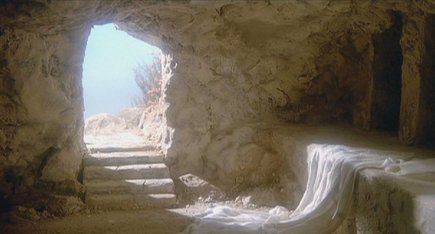
Click this link to read the Evidence for the resurrection!
|
|
The Nazareth Decree
A slab of stone found in Nazareth in 1878, inscribed with a decree form Emperor Claudius (AD 41-54) that no graves should be disturbed or bodies extracted or moved. With the offender being sentenced to Capital punishment on the charge of violation of a sepulcher.
A likely explanation is that Claudius having heard of the Christian doctrine of resurrection and Jesus' empty tomb while investigation the riots of AD 49, decided not to let any such report surface again. This would make sense in light of the Jewish argument that the body had been stolen (Mat. 28:11-15) This is early testimony to the strong and persistent belief that Jesus rose from the dead. More information
A slab of stone found in Nazareth in 1878, inscribed with a decree form Emperor Claudius (AD 41-54) that no graves should be disturbed or bodies extracted or moved. With the offender being sentenced to Capital punishment on the charge of violation of a sepulcher.
A likely explanation is that Claudius having heard of the Christian doctrine of resurrection and Jesus' empty tomb while investigation the riots of AD 49, decided not to let any such report surface again. This would make sense in light of the Jewish argument that the body had been stolen (Mat. 28:11-15) This is early testimony to the strong and persistent belief that Jesus rose from the dead. More information
|
|
What are the top three arguments for Jesus' resurrection?MINIMAL FACTS ARGUMENT FOR THE RESURRECTION OF JESUS CHRIST |
These facts that serve as the foundation for this argument are accepted by the majority of New Testament scholars, both Christians and skeptics alike.
1. Jesus died by crucifixion
2. The disciples of Jesus were sincerely convinced that he rose from the dead and appeared to them
3. Paul (aka Saul of Tarsus), who was a persecutor of the Christians, suddenly changed his beliefs towards Christianity
4. James (brother of Jesus), who was a skeptic of the Christian faith, suddenly changed his beliefs towards Christianity
5. The Tomb of Jesus was found empty three days after the crucifixion of Jesus (Habermas and Licona 2004, 48-76)
1. Jesus died by crucifixion
2. The disciples of Jesus were sincerely convinced that he rose from the dead and appeared to them
3. Paul (aka Saul of Tarsus), who was a persecutor of the Christians, suddenly changed his beliefs towards Christianity
4. James (brother of Jesus), who was a skeptic of the Christian faith, suddenly changed his beliefs towards Christianity
5. The Tomb of Jesus was found empty three days after the crucifixion of Jesus (Habermas and Licona 2004, 48-76)
Which explanation happened to Jesus to make the best sense of the evidence.
The theories include:
• Hallucination
• Swoon
• Stolen Body
• A Legend Invented by Jesus' Followers
• A Legend that Evolved Over Time
• Twin
• ResurrectionClick this link to read the
Evidence for the resurrection!
